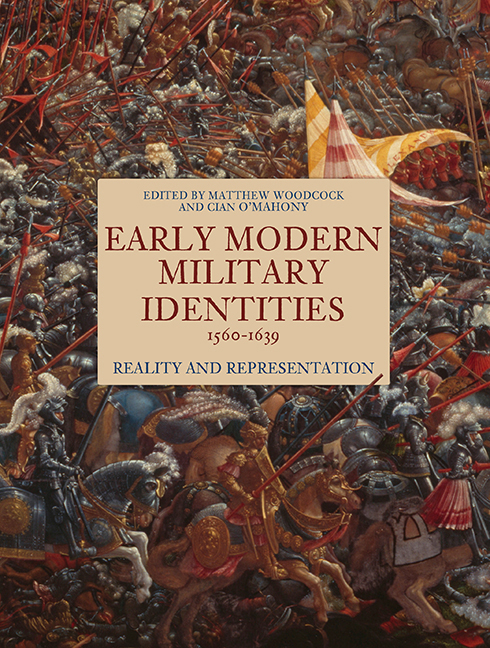Book contents
- Frontmatter
- Contents
- List of Illustrations
- List of Contributors
- Acknowledgments
- List of Abbreviations
- Introduction
- Part I Models of Military Identity
- Part II Military Identities in Early odern Ireland
- Part III Staging Military Identities
- 10 Othello and the Braggart Soldier in the Context of Elizabethan War Veterans
- 11 ‘Lay by thine Arms and take the Citie then’: Soldiery and City in the Drama of Thomas Middleton
- 12 ‘Sometimes a figure, sometimes a cipher’: Dramatic Assertions of Martial Identity, 1580-1642
- Afterword: The Way Ahead
- Bibliography
- Index
11 - ‘Lay by thine Arms and take the Citie then’: Soldiery and City in the Drama of Thomas Middleton
from Part III - Staging Military Identities
Published online by Cambridge University Press: 14 September 2019
- Frontmatter
- Contents
- List of Illustrations
- List of Contributors
- Acknowledgments
- List of Abbreviations
- Introduction
- Part I Models of Military Identity
- Part II Military Identities in Early odern Ireland
- Part III Staging Military Identities
- 10 Othello and the Braggart Soldier in the Context of Elizabethan War Veterans
- 11 ‘Lay by thine Arms and take the Citie then’: Soldiery and City in the Drama of Thomas Middleton
- 12 ‘Sometimes a figure, sometimes a cipher’: Dramatic Assertions of Martial Identity, 1580-1642
- Afterword: The Way Ahead
- Bibliography
- Index
Summary
My Lorde,
Touchynge our matters here, and what hathe fallen oute sithence you departed, maye perchance not be unpleasente to you to heare. Manie have beene the made caps rejoicinge to oure new kynges cominge, and who in good trothe darede not have set forthe their good affection to him a month or two agoe; but, alas! what availeth truthe, when profite is in queste? You were true and liege bondsman to her late Highnesse, and felte her sweete bounties in full force and good savour. Nor dide I my poor self unexperience her love and kyndness on manie occasions; but I cannot forbeare remembringe my dread at her frownes in the Iryshe affair, when I followede my General, (And what shoude a Captaine do better?) to Englande a little before his tyme: If Essex had met his appoynted time, as Davide saithe, to die, it had fared better, than to meet his follie and his fate too. But enoughe of olde tales; a new kynge will have new soldiers, and God knowethe what men they will be.
It is in this way that Sir John Harington, godson to Elizabeth I, addressed a letter to Lord Thomas Howard in the accession year of 1603. At this critical moment of political parturition, uppermost in the correspondent's mind was the radical re-configuration of political and military allegiances in the aftermath of the earl of Essex's vain attempt at a coup d’état in the armed revolt of 1601 and the death of the last Tudor sovereign in 1603, the year this letter was written. Harington had been knighted during the 1599 Irish campaign under Essex's command but, faced on his return with his godmother's implacable ire, he had soon come to wish that he ‘had never received my Lorde of Essex's honor of knighthood’
Decades earlier, in A Generall Rehearsall of Warres (1579), Thomas Churchyard recalled a time when
all Chevalrie was cherished, Soldiours made of, and manhoode so muche esteemed, that he was thought happie and moste valiaunt, that sought credite by the exercises of Armes, and dissipline of warre [and] he was counted nobodie, that had not been knowen to bee at some valiaunte enterprice [for the] advaunsement of his Countrey.
- Type
- Chapter
- Information
- Early Modern Military Identities, 1560–1639Reality and Representation, pp. 235 - 255Publisher: Boydell & BrewerPrint publication year: 2019

